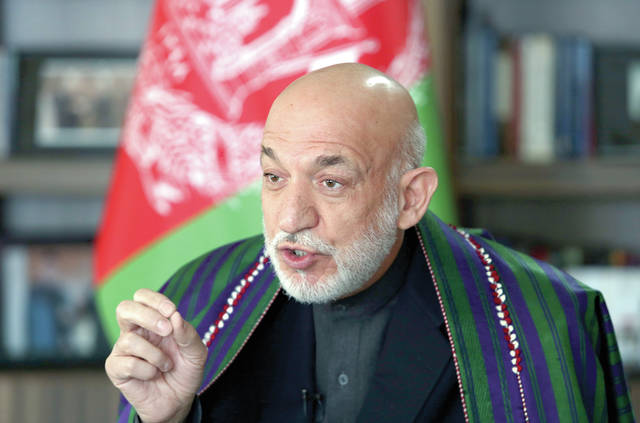KABUL, Afghanistan — Saying that Afghanistan is in “terrible shape” 16 years after the collapse of the Taliban, former President Hamid Karzai accused the United States and Pakistan of using the Afghan war to further their own national interests.
He also warned that Afghans who had embraced the U.S. as a friend and liberator now see it as “hurting us, not helping us.”
“That has to change,” Karzai said in an interview with The Associated Press.
As many as 16,000 U.S. forces remain in Afghanistan, and a special training unit is scheduled to deploy early this year. After the U.S. and NATO forces formally concluded their combat mission at the end of 2014 and shifted to a training role, a resurgent Taliban stepped up their attacks and an affiliate of the Islamic State group emerged in Afghanistan.
That same year marked the end of Karzai’s second and final term in office.
In the interview at his Kabul home, where he wore his signature ankle-length green striped coat and karakul cap, Karzai echoed complaints from Afghanistan’s current government that accused neighboring Pakistan of harboring Taliban militants and he urged the U.S. to impose sanctions on Pakistani military and intelligence officials.
Citing U.S. President Donald Trump’s New Year’s Day tweet that accused Pakistan of “lies and deceit,” Karzai said, “We hope the U.S. will now act in Pakistan.”
But he added that “doesn’t mean that the Pakistan people should be hurt or that war should be launched in Pakistan.”
“In other words I want the U.S. to impose sanctions on the Pakistan military and the intelligence, not on the Pakistani people,” Karzai said.
Trump has ramped up pressure on Pakistan this year, suspending up to $2 billion in military aid to Islamabad after accusing it of failing to crack down on militants who launch cross-border attacks on U.S. and Afghan forces.
Pakistan denies such allegations, blaming the violence on the Kabul government’s security failures.
The interview came a day after U.S. lawmakers questioned the direction of America’s longest war. At a hearing Tuesday, the Senate Foreign Relations Committee noted that Washington is spending about $45 billion a year in Afghanistan, with most of the money going to security, the bulk of which finances U.S. troops and accompanying logistical support. Only $780 million goes toward economic aid.
In recent weeks, Kabul has been battered by a wave of attacks claimed alternately by the Taliban and a rival Islamic State affiliate, which killed scores of people and exposed the U.S.-backed government’s failure to secure the capital.
“The U.S. cannot tell us, ‘Well if I am not here, you will be worse off.’ We are in a terrible shape right now. … We want to be better. We want to have peace. We want to have security,” Karzai said.
In the early years of Karzai’s administration, which was criticized as corrupt, oversight of the war was nonexistent. Commanders allied with the U.S.-led coalition often steered their American partners toward attacking their own enemies to try to settle old scores, rather than build the nation.
Today, Afghanistan’s National Unity Government, paralyzed by bickering and feuding, shares power between President Ashraf Ghani and his chief executive, Abdullah Abdullah. The power-sharing deal was brokered by then-U.S. Secretary of State John Kerry.
Karzai called it a U.S. creation and said it “undermined Afghan democracy and the Afghan constitution.”
He did not hide his frustration during the interview. He believes Washington wants to establish permanent bases in Afghanistan to project power in the region, while Pakistan wants to turn Afghanistan into a client state.
He said that U.S. forces are not in Afghanistan “to stop extremism.”
“In my view, their intention is to keep us divided and weak so they can carry on their objectives in this region,” Karzai said. “They have their global politics and rivalries. They have China as a great rising power. They have Russia as a revitalized, re-energized great power on the world scene, and they feel threatened and challenged.”
He even suggested that reports from northern Afghanistan accused the U.S. of aiding the Islamic State affiliate against ethnic Tajik fighters in a bid to threaten Russia, which has reinforced its bases in Central Asia, against a burgeoning IS insurgency bolstered by Uzbek radicals formerly aligned with the terrorist group known as the Islamic Movement of Uzbekistan.
Public opinion in Afghanistan, which has always been critical of Pakistan, has increasingly turned against the U.S. as the war has dragged on. Public sentiment also runs against the presence of foreigners in the country along with the Kabul government, which is perceived as deeply corrupt and incompetent.
In Kabul’s western neighborhood of Kot-e-Sangi, day laborers gather by the hundreds at dawn in freezing temperatures, hoping for work.
Mohammed Daoud comes every day for the 300 Afghanis — roughly $4 — that he sometimes earns. Deteriorating security in the Afghan capital has meant less work and he blames both the government and also the coalition.
“The government looks after only itself. And what are the foreign soldiers doing? Nothing,” he said.
Karzai said Afghans have to retake their country.
“We must implement our constitution and we must do all we can as a people to restore ourselves to the ownership of this country, which we don’t have right now,” he said.
“Right now it is the U.S. policy that owns it.”



